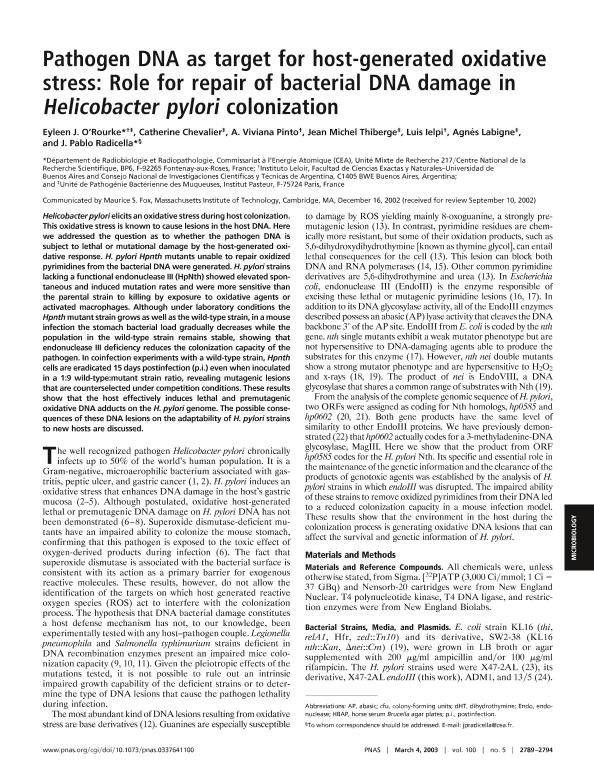Artículo
Pathogen DNA as target for host-generated oxidative stress: Role for repair of bacterial DNA damage in Helicobacter pylori colonization
O'Rourke, Eyleen J.; Chevalier, Catherine; Pinto, A. Viviana; Thiberge, Jean Michel; Ielpi, Luis ; Labigne, Agnes; Radicella, Juan Pablo
; Labigne, Agnes; Radicella, Juan Pablo
 ; Labigne, Agnes; Radicella, Juan Pablo
; Labigne, Agnes; Radicella, Juan Pablo
Fecha de publicación:
02/2003
Editorial:
National Academy of Sciences
Revista:
Proceedings of the National Academy of Sciences of The United States of America
ISSN:
0027-8424
e-ISSN:
1091-6490
Idioma:
Inglés
Tipo de recurso:
Artículo publicado
Clasificación temática:
Resumen
Helicobacter pylori elicits an oxidative stress during host colonization. This oxidative stress is known to cause lesions in the host DNA. Here we addressed the question as to whether the pathogen DNA is subject to lethal or mutational damage by the host-generated oxidative response. H. pylori Hpnth mutants unable to repair oxidized pyrimidines from the bacterial DNA were generated. H. pylori strains lacking a functional endonuclease III (HpNth) showed elevated spontaneous and induced mutation rates and were more sensitive than the parental strain to killing by exposure to oxidative agents or activated macrophages. Although under laboratory conditions the Hpnth mutant strain grows as well as the wild-type strain, in a mouse infection the stomach bacterial load gradually decreases while the population in the wild-type strain remains stable, showing that endonuclease III deficiency reduces the colonization capacity of the pathogen. In coinfection experiments with a wild-type strain, Hpnth cells are eradicated 15 days postinfection (p.i.) even when inoculated in a 1:9 wild-type:mutant strain ratio, revealing mutagenic lesions that are counterselected under competition conditions. These results show that the host effectively induces lethal and premutagenic oxidative DNA adducts on the H. pylori genome. The possible consequences of these DNA lesions on the adaptability of H. pylori strains to new hosts are discussed.
Palabras clave:
Helicobacter Pylori
,
Dna Damage
Archivos asociados
Licencia
Identificadores
Colecciones
Articulos(IIBBA)
Articulos de INST.DE INVEST.BIOQUIMICAS DE BS.AS(I)
Articulos de INST.DE INVEST.BIOQUIMICAS DE BS.AS(I)
Citación
O'Rourke, Eyleen J.; Chevalier, Catherine; Pinto, A. Viviana; Thiberge, Jean Michel; Ielpi, Luis; et al.; Pathogen DNA as target for host-generated oxidative stress: Role for repair of bacterial DNA damage in Helicobacter pylori colonization; National Academy of Sciences; Proceedings of the National Academy of Sciences of The United States of America; 100; 5; 2-2003; 2789-2794
Compartir
Altmétricas



